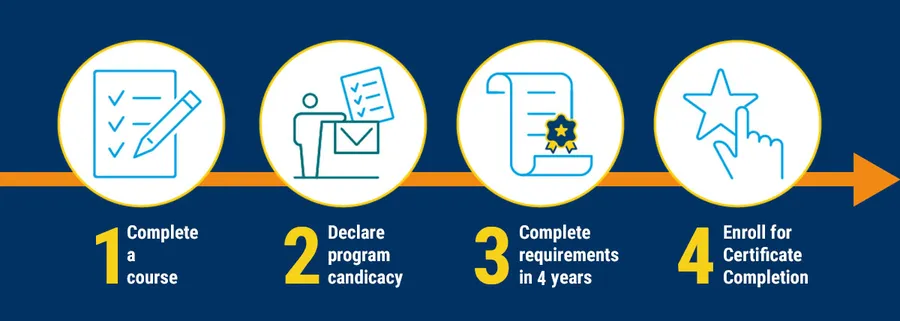Happy Independence Day!
Offices are closed Friday, July 4.

Biotechnology
At the nexus of biology and tech
CONTACT US
certificate Description
Program Retirement
Thank you for your interest in the Biotechnology certificate program. You are invited to enroll in any open course and pick up the practical skills you need, however, we are retiring this program in summer 2025. Please contact extension@ucsc.edu if you have any questions or need assistance.
Work in the biotechnology field
- Work in biopharmaceutical and biotechnology companies
- Specialize in academic research
- Lead development in bioscience laboratories
- Pursue graduate-level training
Biotechnology program offers a variety of scientific fields (biochemistry, molecular biology, drug development [including pharmacology & pharmacokinetics], gene therapy, immunology, cancer biology, human physiology, virology [including COVID-19], & DNA sequencing), the program provides students seeking jobs in multiple bioscience-based industries or the academic research environment the opportunity to enhance their knowledge and skill sets for relevant job openings.
For the student seeking a career in the biopharmaceutical industry, the courses in the program provide the student with a comprehensive understanding of how biotechnology is used in the drug discovery and development process to enhance their qualifications as a job applicant.
For the student seeking a career in the biosciences in the academic, government, or private foundation research environment, the courses in the program provide the student with an understanding of the principles and technologies used to support biotechnology research to enhance their qualifications as a job applicant.
For the student interested in enhancing their qualifications for graduate level programs in the biosciences, the courses in the program provide the student the opportunity to gain additional knowledge on the multiple biotechnologies used in their area of interest to support their application for admission.
The principal goals of the courses offered in the program are focused on providing students with the necessary background and knowledge in the multidisciplinary area of biotechnology to support their career interests in the biotech and biopharmaceutical industries as well as the biological research environment represented by academic laboratories and other bioscience-based laboratories.
Biotechnology certificate program objectives
- Demonstrate knowledge of the scientific disciplines and principles that professionals rely on in the application of biotechnology to a variety of fields, including:
- Discovery and development of new drugs and therapies.
- Bioscience-based research in the academic environment.
- Government biological research laboratories.
- Private biology-related research foundations.
- Develop an appreciation of the latest technologies employed in the biopharmaceutical field to bring new drugs to the market.
- Acquire knowledge to seek employment in biotechnology, biopharmaceutical industries, academic research, and bioscience environments.
Program Overview
Estimated Cost: $5,610–$6,200 + Estimated Course Materials: $1,000 (You pay only for courses you enroll in.) | International Tuition Cost
Program Requirements: 7 courses (19 quarter units). Take 3 core courses (10 quarter units) and 4 elective courses (9 quarter units). End with a certificate of completion review.
Minimum Hours of Instruction: 190 hours of instruction.
Estimated Duration: A full-time student can complete the certificate in 12 months.
Modality: This is a fully online program with live-online & self-paced course formats.
Courses
1. Prerequisite(s):
2. Core Required Course(s): Total of Ten Units
3. Electives: Nine Units Required
4. Completion Review:
Meet Our Instructors
Certificate Inquiry Form
Recommended Course Sequence
Please follow this sequence. Begin with Principles of Drug Discovery and Development. After that, courses may be taken in any order provided the prerequisites are met. Certificate candidates also must take the other two core courses, Biochemistry: An Introduction and Immunology, Principles. Finally, students must select at least one course from each of the two elective course tracks: Discovery and Development. You can learn more about each course in the Syllabus Library.
Substitutions
TRANSFERRING CREDIT FROM OTHER INSTITUTIONS
You may substitute one equivalent course from another institution for a course in the certificate program with prior approval, if:
- you've completed the course within the past five years at an accredited academic institution;
- you received a final grade of C or better;
- the content of the substituted course covers the same material as the UCSC Extension required course; and
- the course carries the equivalent credit or more.
To receive your certificate
Upon completion of the course sequence, you may request your Biotechnology Certificate Completion Review.
Also of interest
Requisite Knowledge
Modern molecular biology
Familiarity with the principles of modern molecular biology is required to begin the Biotechnology certificate. You can satisfy this requirement by completing an introductory course, such as Experimental Methods in Molecular Biology within the last five years or by demonstrating equivalent work experience.
Please review each course description to ensure that you have taken necessary prerequisites or meet the requirements through job experience or previous education.
Establish Candidacy
Grade Requirements
Please note that only letter grades of C or higher may be applied to a certificate, and in some programs, students may have more stringent requirements. Students in most employer- and government-sponsored payment programs, such as workforce development, as well as international students on F-1 visas, need to maintain a B average to meet their requirements.
See Grading and Credits Policy for further information.










